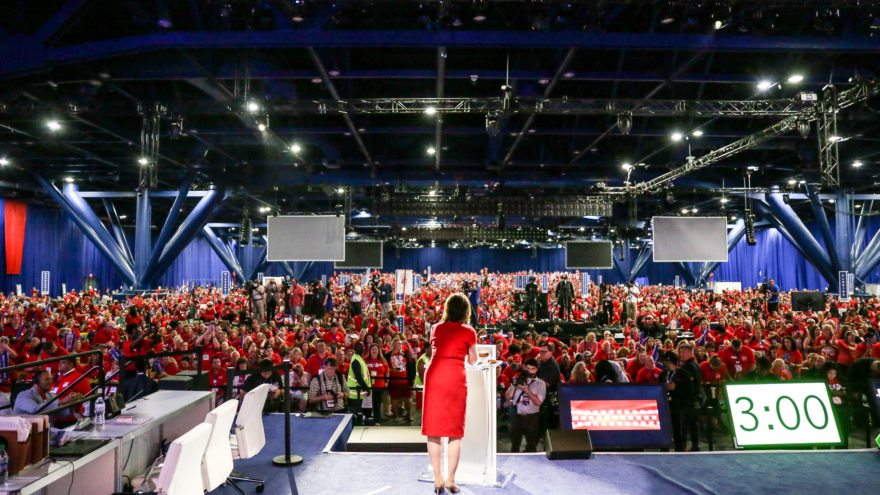The National Education Association – the nation’s largest teachers union – has decided against an effort to “re-dedicate itself to the pursuit of increased student learning in every public school in America by putting a renewed emphasis on quality education.”

Tammy Smith of Arkansas recently proposed New Business Item 2 at the NEA’s 2019 Representative Assembly to ensure “NEA will make student learning the priority of the organization.”
The proposal seemed pretty straight forward for an association of well over 1 million educators who are presumably dedicated to the students they serve in schools across the nation. With the NEA’s slogan of “Great Public Schools for Every Student,” the proposal would seem like a slam dunk.
“NEA will not waiver in its commitment to student learning by adopting the following lens through which we will assess every NEA program and initiative: How does the proposed action promote the development of students as lifelong reflective learners?” the item read.
The proposal came with no real added cost to the organization, but would have tasked the NEA’s Budget Committee with making decisions with a focus on things that actually help kids learn in school.
The resolution was ultimately defeated, which will likely only inflame criticism about the organization’s partisan liberal agenda. For decades, parents, educators and school officials have pointed out how teachers unions affiliated with the NEA and American Federation of Teachers have shifted away from their stated mission of improving education to promote liberal politics many members disagree with.
Analysis of teacher union spending shows much of the money collected by the nonprofits is funneled to support liberal lawmakers and causes like abortion advocacy, open borders, LGBTQ issues, slavery reparations, climate change and others.
Resolutions that were adopted by members at the NEA’s 2019 assembly illustrate why Smith’s call to refocus on providing a quality education for students – and to justify spending with that same goal in mind – is problematic.
The NEA’s first order of business – New Business Item A – focused on condemning and obstructing Immigration and Customs Enforcement action against immigrants in the country illegally. The item, which will cost an additional $421,000 from the union’s budget, tasks the NEA with advocating against ICE raids, both through protests and the courts, and to fight for “immigrant justice” by mobilizing members to lobby lawmakers.
New Business Item A was adopted.
Another critical proposal –New Business Item 5 – was approved by representatives to require NEA policy statements, legislative materials, resolutions, constitution and bylaws to be rewritten to ensure “these documents incorporate language that is democratically inclusive of all NEA members.”
There was also the approval of important union insurance matters, an initiative to create a toolkit to help mitigate the bad effects of screen time, as well as $7,500 dedicated to incorporating the concept of “White Fragility” into union trainings and communications “wherever and whenever context and expense allows.”
Union reps also approved New Business Item 12 to spend $12,500 promoting the census, New Business Item 13 to spend $19,200 on ethnic studies and institutional racism, and New Business Item 14 to draft model legislative language to trash standardized tests used for teacher certifications.
The union also approved spending money to promote the Black Lives Matter Week of Action, and to create a special space on “all individuals’ name tags, badges, and IDs for the Individuals’ pronouns,” the latter costing $6,125.
There was approved spending to support and recruit “educators of color,” $106,000 to “involve educators, students and communities in the discussions around support for reparations,” and $1,000 to “publicize the investigation that has uncovered state and federal funding for confederate museums, shrines, and groups that present a distorted view of history and perpetuate racist ideology.”
To be fair, a couple of the approved NEA resolutions did pertain to education, including a push to teach more about “the imminent crisis of climate change,” $15,500 to evaluate alleged institutional racism in career tech programs, $6,000 to advocate for school composting programs, and $12,000 to develop “K-12 cross content curriculum that is LGBTQ+ inclusive.”
Leave a Comment
COMMENTS POLICY: We have no tolerance for messages of violence, racism, vulgarity, obscenity or other such discourteous behavior. Thank you for contributing to a respectful and useful online dialogue.